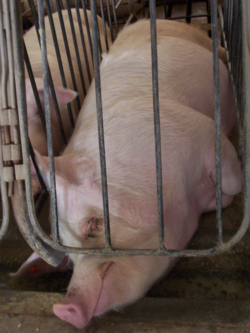Right to Know, Wrong to Sow — D.C. Circuit Court of Appeals delivered a blow to the National Pork Producers Cou ncil’s efforts to keep consumers in the dark
By Wayne Pacelle
This morning, I awoke to unseasonably cool weather in Washington, D.C. As the day progressed, we got a different kind of cool – the D.C. Circuit Court of Appeals delivered a blow to the National Pork Producers Council’s efforts to keep consumers in the dark about where their food comes from and affirmed Country of Origin Labeling (COOL) rules adopted by Congress and the U.S. Department of Agriculture.
Consumers have a right to know where their meat is coming from so they can choose to avoid meat from inhumanely raised animals. Photo: The HSUS
The USDA issued the rule last year, which simply requires meat product labels to show the country in which the animal was born, raised and slaughtered. That proved too much transparency for the NPPC, which joined with other meat industry lobbyists to sue the USDA over the rule, claiming corporate meat processors have a constitutional right to withhold such information from consumers.
We countered by partnering with the Organization for Competitive Markets, United Farm Workers of America, American Grassfed Association and three independent family-owned farms to defend the labeling rule. In our amicus brief to the D.C. Circuit Court, we argued that consumers have a right to know where their meat is coming from, so that they can choose to avoid meat from inhumanely raised animals. Kevin Fulton, an independent rancher and member of our Nebraska Agriculture Council, explained that “country-of-origin labeling allows consumers to make an educated choice, which ultimately helps the American family farmer.”
Today the D.C. Circuit Court agreed, finding that consumers have a legitimate interest in knowing where their food comes from. The court rejected the meat industry’s turn-logic-on-its-head argument that it had a First Amendment right to not inform consumers about the origins of their meat. This ruling is a major setback, and expense, for the NPPC and others in industrial meat production.
The attack on the labeling rule is just the latest attempt by the NPPC to shield the public from a close look at its business model, as well as its efforts to thwart progress on animal welfare. For years, the NPPC has been backing “ag-gag” laws that criminalize investigations into the cruel and unsanitary conditions at factory farms. And the NPPC fought to scuttle our agreement with the United Egg Producers, which would have provided customers with information on the carton about how the eggs were produced (e.g., “eggs from caged hens”).
I’ve written about the NPPC’s stubborn defense of gestation crates, which even the pork industry’s own animal welfare consultant, Dr. Temple Grandin, says “have got to go.” And last week I blogged about how the NPPC is trying to force pork from pigs treated with a potentially dangerous drug, ractopamine, onto European consumers.
If the NPPC is proud of its product, and its methods of production, neither country-of-origin labeling nor more transparency on the farm should cause them the least of concern. But when you see the inside of these industrial confinement facilities, and understand the drugging practices on industrial farms, you can well understand why they want to conceal the reality from their customers. The HSUS will continue to work for more transparency, more humane treatment, more awareness and more conscious shopping by consumers.
